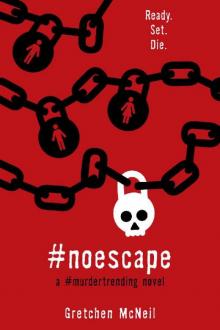- Home
- Gretchen McNeil
#MurderTrending Page 12
#MurderTrending Read online
Page 12
“Thou dost squirm too much,” Robin cackled. “Dost thou want me to miss?”
With a whoosh and a thwack, an arrow flew through the air and struck the target three inches to the left of her head. Another hiss of air, and a second arrow hit just below her right arm. Then a third, between her legs.
Dr. Farooq was hysterical now, the tear trails arcing across her cheeks as the target continued to spin, and despite the anger she held toward the psychiatrist, Dee felt her fear so tangibly it was as if she was there, strapped to the target in her place. No escape. No reprieve. The end in sight. And she couldn’t help but pity the doctor.
Robin chuckled. “Wouldst thou that I use a larger weapon?”
The music stopped, anticipation building in the silence. A crack shattered the quiet as an enormous wooden stake was propelled at Dr. Farooq’s body with such force that it impaled her stomach. This time her scream was bloodcurdling, her eyes wide in pain and terror, as the life slowly drained from her body.
The wheel stopped turning. Her head lolled forward.
“Listen to the sound of my voice,” Robin said, strangely out of character. “Relax into the past and tell me what you see.”
Then the video went black.
“LISTEN TO THE SOUND of my voice,” Dr. Farooq said. “Relax into the past and tell me what you see.”
Dee’s eyes were closed, but she could feel Dr. Farooq’s breath against her cheek as the psychiatrist leaned in.
“Relax into the past,” Dr. Farooq repeated. “There is no present. There is no future. Only you and your memories.”
Dee was pretty sure that hypnosis was a load of crap, but since her life was on the line with this trial, she figured she might as well try. If Dr. Farooq could actually regress Dee’s memories back a week to the time of Monica’s murder, her hypnosis-induced account of what happened that day would prove that she was innocent.
So she relaxed, as Dr. Farooq had told her to do. And listened to the doctor’s voice. And allowed herself to fall back into the past.
“You’re home after school.” Dr. Farooq’s voice sounded heavy and far away, as if Dee were hearing it through a pair of earplugs. “In your room. Your sister Monica is next door. Is that correct?”
“Hm-mm,” Dee said. She felt dreamy, like she was floating in a pool of warm water, every inch of her body submerged but her face.
“How do you know Monica is in her room?”
“We walked home from school. Together.”
“Yes, but how do you know?” There was a sharpness in Dr. Farooq’s voice that unnerved Dee. Like she was being reprimanded for not knowing the correct answer to a math problem.
“I—”
“Can you hear her?”
“No. She’s doing homework.”
“But surely you can hear her. Your rooms are so close.”
Dee felt as if something were holding her down, binding her arms and legs, and she struggled to remain free. “No,” she said, almost shouting the word.
“Relax.” The word was instantly soothing, and Dee felt free again, the panic abating. “Relax. Now, you’re lying on your bed, and you can hear your sister, Monica, in her room.”
No. Dee said it in her mind, then heard a different word spoken in her own voice. “Yes.”
“You hear Monica on the phone. With one of her friends.”
No. Monica never talked on the phone. Just texted and posted on social media. “Yes.”
“They’re talking about you, Dee. Talking about how they don’t like you. How they don’t want to be your friend anymore.”
“NO!” The word burst from Dee’s lips. She had to fight to get it out—every muscle in her body felt as if it was being controlled by someone else—but Dee couldn’t agree to what Dr. Farooq was saying it. It wasn’t right. It wasn’t true.
Was it?
“Relax, Dee. Relax. There is no present. There is no future. Relax into the past.”
“Relax,” Dee repeated.
“You thought Monica was your friend.” Dr. Farooq’s voice was silky smooth. So easy on the ears. “You thought she cared about you. But you realize she only wants to humiliate you.”
“Yes.”
“And you hate her. You want her to feel the same kind of pain she’s made you feel.”
“Yes.”
“You go to her room, silently open the door. She doesn’t hear you as she’s turning off her phone.”
No.
“Your hands are around Monica’s neck. Squeezing. You hate her. You want her dead. You’ve been waiting a long time to let out your rage.”
The bonds were back, thick ropes around Dee’s arms and legs. They cut into her flesh, pulling her body down below the surface of the water. She fought against them, flailing as she tried to kick for the surface. No! No! No! She didn’t do this. She didn’t kill Monica.
“Monica’s eyes bulge from their sockets. Her face turns red, then purple. Her strength is failing, and you can feel the cartilage in her throat snap as you crush her windpipe.”
No!
“Now she’s still. Her chest doesn’t move. Her heart doesn’t beat. And you let her dead body fall to the floor. Don’t you, Dee?”
Yes. She’s had this rage burning inside her ever since her days in the white room. Six years. The anger had to burst, didn’t it? That’s what Dr. Farooq is saying. And she knows. She knows everything.
“Yes.”
Dee heard a soft click in the background, like a finger on a keyboard. “Now, Dee, tell me in your own words what happened that day in your house.”
Dee sat motionless beside her lawyer, listening to the sound of her own voice on the recording: “I go to her room, silently opening the door. My hands are around Monica’s neck. Squeezing. I hate her. I want her dead. I’ve been waiting a long time to let out my rage.”
“No,” Dee said. “That’s a lie. That never happened.”
“The defendant will remain silent,” the judge ordered. “You will have your chance to testify.”
Dee rocketed to her feet and pointed her finger at Dr. Farooq. “But she’s lying! She made me say those things!”
Dr. Farooq turned to the judge. “Sometimes during a hypnotic regression, the subject transposes their guilt onto the guide. In this case, Dee’s subconscious has blocked out her participation in Monica’s murder, instead shifting the blame to me.” Then she smiled at the jury. “All too common in my line of work, I assure you.”
The jury smiled back. They were on her side.
“I didn’t do this,” Dee said, desperate that someone would believe her.
“Miss Guerrera,” the judge said. “Sit down or I will find you in contempt.”
But Dee didn’t care. She spun around, searching for her father in the packed courthouse. He sat two rows behind her, his face gaunt. Tears streamed down his cheeks.
“She’s lying,” Dee said, pleading with him. “I didn’t do this.”
The judge banged his gavel while Dee’s attorney pulled her arm, trying to get her to sit back down.
“I didn’t do it!” Dee screamed. “I didn’t! I didn’t! I didn’t!”
“I didn’t kill her,” Dee said.
“Yeah, Princess,” Griselda said. The words were still flippant, but there was something softer about her tone. “You’ve told us about a billion times.”
“What’s wrong, Dee?” Nyles knelt by her side, his hand on top of hers.
“Dr. Farooq tried to make me believe that I killed Monica,” Dee explained. The vision of Monica’s death was so real, so visceral. But it was fake—it had to be.
“She’s gone now,” Nyles said. “Perhaps justice really has been served on Alcatraz?”
Dee turned to meet his gaze. “But don’t you see? She was killed for a reason.”
“Yeah,” Griselda said. “For landing all of us in here.”
“I thought Robin said it was a malpractice thing,” Ethan said. “Or am I making that up?”
“She never ha
d a trial,” Dee said, choosing not to explain to Ethan that malpractice was not a capital crime. “I bet everything Robin said was a lie. The Postman wanted to get her out of the way so she could never testify against him for my sister’s death.”
“Against The Postman?” Nyles asked. “I thought you said that Gucci Hangman killed your sister.”
Dee shook her head. First Gucci Hangman, then Robin’s Hood. Both giving her clues. The Painiacs probably had no idea what they meant—they’d been given information from above and they were just following orders. Monica’s death wasn’t the action of a lone, unhinged Painiac. It was connected to something bigger—to Kimmi and the white room and The Postman.
“One thing’s for sure,” Ethan said, scratching his chin. “Someone really doesn’t want our trials to be reopened.”
FOR THE FIRST TIME since Dee had arrived on the island, the fog didn’t creep across the bay toward Alcatraz 2.0 as the sun disappeared behind the horizon. The night was clear and moonless, but even though the moisture was gone from the air, Dee felt chilled to the bone.
She’d been in a daze since Dr. Farooq’s murder. Locking up I Scream, buying dinner at the bodega, walking back to the Barracks—all of it seemed removed and far away, as if the fog that usually surrounded the island had instead enveloped Dee’s mind.
Kimmi. Dr. Farooq. Western Sierra State Mental Hospital.
Dr. Farooq had worked there. Kimmi was a patient there. They were both connected to Dee. Could they both also be connected to The Postman?
I’ll kill everyone you love.
Could Kimmi’s dad be The Postman?
Do you want to be my sister?
Over and over, hour after hour, Kimmi had asked Dee the same question from the air vent. At first, Dee would answer with her own questions: Who are you? Do you go to my school? Where am I? And the most important of all, Why me?
The “why me” part haunted Dee in the periods between Kimmi’s visits. She’d sit in the blaring silence, trying to figure it out. Had she done something wrong? Was that why she was in the white room? Was Kimmi angry at her? Punishing her?
Do you want to be my sister?
Dee wasn’t sure how to answer. She’d always wanted a sister. She’d even written a poem about it, just a few months before, which had been published in the local paper. Being an only child could be lonely, especially with a single parent who worked long hours. Dee spent a lot of time with babysitters and in after-school programs, and while friends were fun, they weren’t the same as having a built-in playmate and companion.
But now Dee wished she’d never written that poem, never hoped for a sister. Because Kimmi scared the crap out of her.
“Do you want to be my sister?”
“Why me?” Dee sobbed. “Why are you doing this to me?”
Kimmi tilted her head to the side, confused that Dee didn’t know the answer already. “Because we’re so much alike.”
That had stuck with Dee, the idea that she was as ruthless and as twisted as her kidnapper. Therapists had tried to convince her otherwise, using big concepts like “Stockholm syndrome” and “psychological imprinting,” but Dee had always felt, deep down, that maybe Kimmi was right.
And Dr. Farooq’s recording seemed to prove it.
Stop.
Dee wasn’t Kimmi. Would never be Kimmi. She wasn’t selfish, and she cared about people. Like Mara.
The lights were on in Mara’s house, every window brightly illuminated. It felt almost warm and inviting against the chill of the night, and though Dee knew instinctively that no place on Alcatraz 2.0 was ever safe, having a next-door neighbor was a nice illusion.
She knocked lightly at the door. “Mara? It’s Dee.”
Silence. She didn’t hear a sound from inside. No creak of floorboards, no patter of footfalls. Immediately Dee’s heart began to pound in her chest. Something was wrong. Mara knew the sound of her voice, and Dee was pretty sure that she’d open up if she could.
“Mara?” Dee pounded on the door, feeling the same panic as when she’d found Monica’s body on the floor of her room, unnatural, unmoving. “Mara, are you all—”
The door flew open while Dee was mid-knock. Mara leaned against it, her eyes heavy with sleep. “Sorry,” she said, stifling a yawn. “I must have dozed off.”
Dee wasn’t sure why she did it, but without thinking, she grabbed Mara by each shoulder and hugged her. It only lasted a second, but it was enough time for Dee to feel herself choking up.
She knew it was completely ridiculous. She hardly knew this girl. Mara wasn’t Monica: Dee needed to remember that.
“Sorry,” she said, releasing Mara quickly. The awkwardness of that hug hung between them. “I brought you some dinner.”
Mara shook herself, throwing off whatever images were running through her mind. “Really?”
Dee handed the bag to her. “It’s lasagna again. The bodega was kind of empty.”
“I don’t mind.” Mara stared into the bag thoughtfully. “That’s weird, though. They should have had a food delivery yesterday.”
“Maybe Nyles can ask—” Dee paused. She was about to say that Nyles could ask about the food delivery tomorrow when he met with his attorney, but she caught a movement out of the corner of her eye. Across the street, one of the crow-shaped cameras had just swiveled to face them.
Someone was always watching, always listening, and the last thing Dee wanted to do was to tip off The Postman that Nyles’s visitation tomorrow would be anything other than 100 percent routine and normal.
“Nothing,” Dee said quickly. “Hey, if you want to come over in the morning, I have some coffee and bananas. For breakfast.”
Mara bit her lip, debating the offer. Dee knew what she was thinking: You shouldn’t trust anyone on Alcatraz 2.0. And yet Dee really hoped Mara would say yes.
“Okay,” Mara said. “See you then.”
Mara shut her front door, and Dee waited until she heard the bolt click into place before she returned to her own house and began her nightly search for intruders.
The downstairs was empty; then Dee swept the upstairs: bathroom, shower stall, both bedroom closets. And though the red dots indicated that all the cameras in Dee’s house were live, evoking a creeping sensation across her skin as if something horrible was about to happen, no masked serial killers lurked anywhere.
Back in the kitchen, Dee looked at the other lasagna at the bottom of her bag, but though she hadn’t eaten much that day, she wasn’t the least bit hungry. Just exhausted.
She desperately wanted to sleep, but that might be a fatal mistake. She needed to stay alive until Nyles’s attorneys could get a message to her dad, and if that meant she didn’t sleep again until she was off Alcatraz 2.0, then so be it.
But that resolve didn’t make her any less tired. Maybe a shower would wake her up?
Dee had seen enough horror movies to know that getting in the shower was a bad idea in the best of circumstances, which these were not.
A washcloth soaked in cold water might be just the trick to revive her.
She headed upstairs, yawned as she yanked open the linen-closet door, and froze.
Written on the inside of the door, in the bright pink lipstick from her cosmetics drawer, was a message:
YOU’LL ALWAYS BE MY SISTER, DOLORES. ALWAYS.
DEE SAT UP ALL night on the stairs. She thought it was the most strategic location in the house. If someone came in through the upstairs windows, then she could make a run for it downstairs. Plus, she’d tied the sheets from her bed together and anchored them to the dresser in the front bedroom, so if someone smashed through the sliding glass door downstairs or kicked in the front entrance, she could escape from the second floor. Like a true fairy-tale princess shinnying down from her tower. It might even score points on fan forums for being a Rapunzelesque maneuver.
Of course, if the Hardy Girls split up and entered her house on both levels at the same time, she was pretty much screwed.
She had be
en exhausted when she’d gone upstairs to wash her face, but the message on the inside of the closet door had sobered her up immediately. If she’d had any doubts about the connection between Kimmi and The Postman, they evaporated in an instant.
Because nobody else knew her real name.
The trial had been on total lockdown, since both Dee and her kidnapper were minors. Pseudonyms were used for both of them, and no press was allowed in the courtroom. Kimmi was only fourteen at the time, and since she hadn’t physically harmed Dee by keeping her locked in the family’s safe room for almost a week—except for the lack of food and sanitation, Dee’s lawyer had pointed out, but whatever—the juvenile court accepted a plea deal. Kimmi was sentenced to the Western Sierra State Mental Hospital for a period no less than ten years. Which meant that she should still be there.
Should.
After the sentencing, Dee and her dad had tried to return to normal lives. Dee went back to school, her dad went back to work at the production company, and despite her insomnia, her constant fear of being alone, and the twice-weekly visits to a therapist, life had settled down.
Then, suddenly, a couple of months after the trial had ended, Dee’s dad sold their condo in Manhattan Beach and moved himself and his daughter to Burbank.
The move was swift, and her dad had given her no warning. He picked her up from school on a Friday afternoon, and when they got home, the movers had already packed up the entire condo. They left that day, and on the drive out to Burbank in Friday rush-hour traffic, Dee’s dad had told her that from now on, her name wasn’t Dolores Hernandez, but Dee Guerrera. She was never to tell anyone who she really was and she could never contact her old friends. He took her cell phone, replaced it with a new one, and erased all her contacts from the cloud. Her dad had never been particularly strict when it came to rules, but on this point he was adamant—they had to leave their old lives behind.

 #NoEscape (Volume 3) (#MurderTrending)
#NoEscape (Volume 3) (#MurderTrending) Relic
Relic I'm Not Your Manic Pixie Dream Girl
I'm Not Your Manic Pixie Dream Girl Possess
Possess Get Dirty
Get Dirty #MurderTrending
#MurderTrending Get Dirty (Don't Get Mad Book 2)
Get Dirty (Don't Get Mad Book 2) Ten
Ten